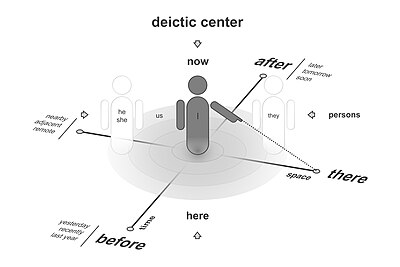
In linguistics, deixis (/ˈdaɪksɪs/, /ˈdeɪksɪs/)[1] is the use of words or phrases to refer to a particular time (e.g. then), place (e.g. here), or person (e.g. you) relative to the context of the utterance.[2] Deixis exists in all known natural languages[3][4] and is closely related to anaphora, with a sometimes unclear distinction between the two.[5] In linguistic anthropology, deixis is seen as the same as, or a subclass of, indexicality.[6]
The term's origin is Ancient Greek: δεῖξις, romanized: deixis, lit. 'display, demonstration, or reference'. To this, Chrysippus (c. 279 – c. 206 BCE) added the specialized meaning point of reference, which is the sense in which the term is used in contemporary linguistics.[7]
- ^ Oxford English Dictionary 3rd Ed. (2003)
- ^ Hanks, William F. (2009-01-01). "Fieldwork on deixis". Journal of Pragmatics. Towards an Emancipatory Pragmatics. 41 (1): 10–24. doi:10.1016/j.pragma.2008.09.003. ISSN 0378-2166.
- ^ Lyons, John (1977) "Deixis, space and time" in Semantics, Vol. 2, pp. 636–724. Cambridge University Press.
- ^ "Deixis – a pragmatic universal? Barbara Kryk", Toward a Typology of European Languages, De Gruyter Mouton, 2011-04-20, pp. 49–62, doi:10.1515/9783110863178.49, ISBN 978-3-11-086317-8, retrieved 2024-06-06
- ^ Schiffrin, Deborah (1990-01-01). "Between text and context: Deixis, anaphora, and the meaning of then". Text - Interdisciplinary Journal for the Study of Discourse. 10 (3): 245–270. doi:10.1515/text.1.1990.10.3.245. ISSN 1860-7349.
- ^ Nunberg, Geoffrey (1993). "Indexicality and Deixis". Linguistics and Philosophy. 16 (1): 1–43. doi:10.1007/BF00984721. ISSN 0165-0157. JSTOR 25001498.
- ^ S. E. M VIII.96; see The Cambridge Companion to the Stoics, 2003, p. 89.